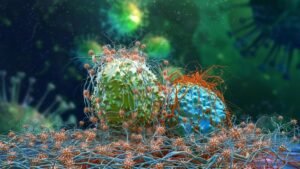A group of Australian researchers has discovered a set of proteins that may change methods for addressing cancer and age-related illnesses.
Researchers at the Children’s Medical Research Institute (CMRI) in Sydney found that these proteins are essential for regulating telomerase- an enzyme that safeguards DNA during cell division, according to Xinhua news agency.
Role of Telomerase
Telomerase plays a crucial role in preserving chromosome ends, called telomeres, aiding in genetic stability.
Telomerase is essential for the well-being of stem cells and specific immune cells; however, studies indicate that cancer cells frequently exploit this enzyme to promote their unregulated proliferation.
ALSO READ: Team India eyes big total as Gill, Jadeja look to carry on Momentum
The CMRI statement indicated that this discovery explains how telomerase promotes healthy aging and simultaneously stimulates cancer cell growth.
The research indicates that these proteins may assist in creating treatments that either decelerate aging or halt cancer.
Uncovering Three Key Proteins in Cancer Cells
The three proteins identified are NONO, SFPQ, and PSPC1. They serve as markers for telomerase, steering it to the tips of chromosomes.
The research suggests that modifying these proteins in cancer cells may hinder telomere maintenance, potentially aiding in the proliferation of cancer cells.

ALSO READ: Health Tips! Smart Food Choices to Immensely Boost your Gut Health
Alexander Sobinoff, the main author of the study, stated, “Our findings indicate that these proteins function as molecular traffic directors, ensuring that telomerase arrives at the correct location within the cell.”
Hilda Pickett, leader of CMRI’s Telomere Length Regulation Unit and senior author of the research, discussed the broader implications of finding these proriens.














